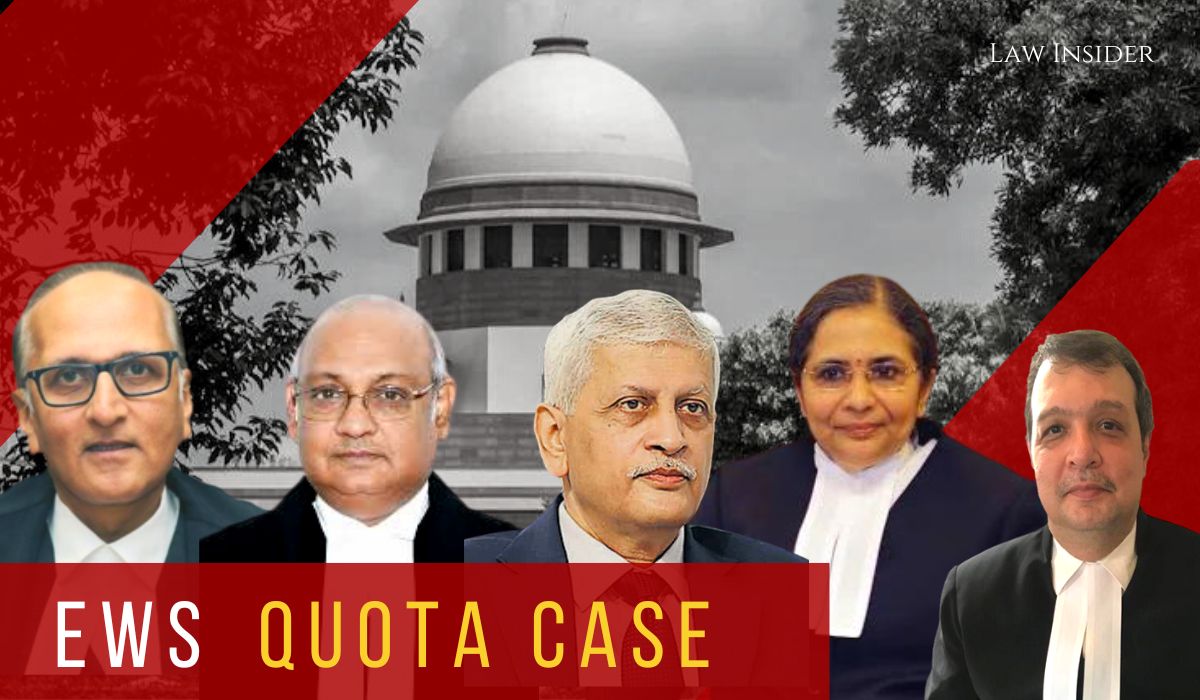Prerna Gala
Published on: 28 September 2022 at 20:46 IST
On Tuesday, marked the end of the Supreme Court’s consideration of a group of petitions contesting the constitutionality of the Constitution (One Hundred and Third) Amendment Act of 2019, which grants reservations to members of economically disadvantaged groups (EWS) [Janhit Abhiyan v. Union of India]
After hearing responses to the Central government’s arguments, a five-judge Constitution Bench comprised of Chief Justice of India UU Lalit and Justices Dinesh Maheshwari, S Ravindra Bhat, Bela M Trivedi, and JB Pardiwala reserved their verdict in the case.
During today’s hearing from Solicitor General (SG) Tushar Mehta, Justice Bhat requested information on scholarships available for admission to professional courses at central institutions.
The SG responded that more seats had been added in order to preserve the total number of seats already set aside for the other reserved groups.
“Ultimately when they get in, what is the aid that they get and fees they pay?” Justice Bhat asked.
He further stated that the scholarships could be need-based or based on merit.
The top court is hearing a number of petitions challenging the amendment on the grounds that economic classification cannot be the only basis for reservation. The petitions were filed by NGOs Janhit Abhiyan and Youth for Equality, among others.
The Amendment Act mandates that 10% of seats in public and private educational institutions, as well as in government employment, be set aside for “economically weaker sections” of citizens who are not members of Scheduled Castes, Scheduled Tribes, or members of socially or educationally disadvantaged classes.
The petitioners said that the amendment violates the Constitution’s fundamental principles and goes above the 50 percent cap on overall reservations required by the ruling in the Indra Sawhney case.
The SG replied, “Those figures would be for Parliament to act on, and would not affect the constitutionality of this [amendment] Act.”
“Yes. We just need the figures, ultimately [the] EWS are [the] poorest of poor getting scholarships,” Justice Bhat insisted.
The SG’s response was, “But since they are getting scholarship so…reservation is a policy issue, not a constitutional issue.”
They have claimed that the 10% allocation of seats for EWS who are not SC/ST/OBCs is arbitrary and excessive.
Attorney General KK Venugopal has set out the following constitutional legal issues for consideration:
- Whether the 103rd Constitutional Amendment, which allows the State to create exceptional provisions, including reservations, based on economic criteria, violates the Constitution’s fundamental principles?
- Whether the 103rd Constitutional Amendment, by allowing the State to impose exceptional regulations for admittance to private unaided institutions, violates the Constitution’s fundamental principles?
- Does the 103rd Constitutional Amendment violate the Constitution’s fundamental principles by removing SEBCs, OBCs, SCs, and STs from the application of the EWS reservation?
Advocate VK Biju argued in favour of the EWS reservation saying that some of the petitioners were mistaken in believing that their rights were being restricted.
“This section is not a vote bank, I’m for poor rickshaw pullers and not against anyone else’s compartment. Nothing happened to that…We must be cautious of section of protected people being misguided that their rights are being taken away.”
Professor Ravivarma Kumar, a senior attorney and a former Karnataka advocate general, opened his argument against the Amendment Act by describing the plight of Nicobari tribal members during the 2005 tsunami.
“…they found that not single Nicobari was touched. After research, it was seen that they are in such close touch with nature. They saw monkeys climbing up the hills, and knew.”
“Why I’m saying this is because they’re the most primitive tribes, away from civilisation and not being Caucasian race like mainland Indians. All these other races are eliminated [from availing EWS quota] because they are the Scheduled Tribes. Entire SC-ST list are castes or tribes.”
The Madras High Court and the Supreme Court both upheld the Communal Government Order of 1927, which Kumar compared the EWS quota to in its current form. Added he,
“Even a constitutional provision eliminating races, castes and tribes also hits at the basic structure. Equality test is turned upside down on the basis of caste, race and tribes. Article 41 [right to work, to education and to public assistance in certain cases] may not be a fundamental right but still”.
Meenakshi Arora, a senior attorney, refuted the Attorney General’s claims that different facts and data supporting the representation of EWS could not render a constitutional amendment illegal.
“My response to this is – the test of a vires is testing if it [Act] has vices, not merely [testing] its objects and reasons. Impact of this actually affects basic structure and equality.”
The argument that not every intrusion into the fundamental structure violates it unless it is a mockery of justice, she continued, cannot be accepted.
“If this is accepted, then you can go ahead and hit the basic structure chip by chip by saying it is not shocking.”
Professor G. Mohan Gopal noted how this Act made being an active member of the community a requirement for receiving government help.
He emphasised that the Act is in “violent contrast” to the fundamental principles of the Constitution because it effectively “set loose reservation in the society as some benign welfare activity.”
The Bench requested that attorneys Shadan Farasat and Kanu Agarwal put together a succinct summary of all the arguments stated in the case.
Earlier, the Centre, in 2019, had also told the apex court that its law, granting a 10% quota for Economically Weaker Sections (EWSs), was mainly to promote “social equality” by providing “equal opportunities in higher education and employment to those who have been excluded by virtue of their economic status”.
The bill was cleared by both the Lok Sabha and the Rajya Sabha on January 8 and 9 in 2019 respectively and it was later on signed by President Ram Nath Kovind. EWS quota is over and above the existing 50 per cent reservation to SCs, STs, and Other Backward Classes (OBCs).

